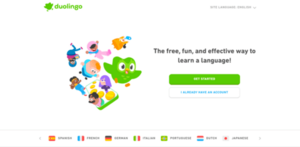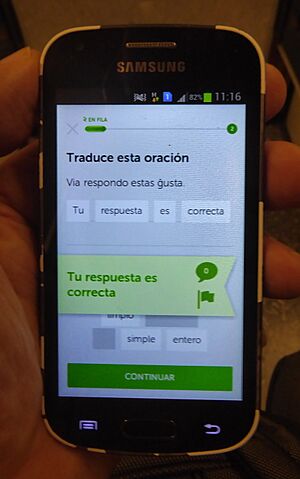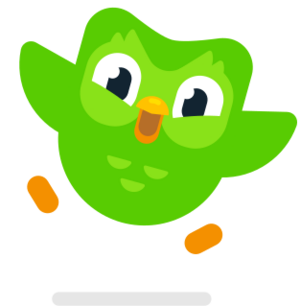Duolingo facts for kids
 |
|

Duolingo home page visited while logged out in March 2024
|
|
| Type of business | Public |
|---|---|
| Available in | |
| Traded as |
|
| Founded | 2011 |
| Headquarters | Pittsburgh, Pennsylvania, U.S. |
| Area served | Worldwide |
| Founder(s) |
|
| Key people | Luis von Ahn (CEO) Severin Hacker (CTO) |
| Industry | Online education |
| Products |
|
| Services | Language, music, and mathematics courses and language assessment. |
| Revenue | |
| Operating income | ▲ US$−13 million (2023) |
| Profit | |
| Total assets | |
| Total equity | |
| Employees | ≈ 850 (September 2024) |
| Advertising | Yes |
| Registration | Yes |
| Users | 113 million MAU (Q3 2024) |
| Launched | November 27, 2011 (private beta) June 19, 2012 (public release) |
| Current status | Online |
| Native client(s) on | Android, iOS, iPadOS |
Duolingo Inc. is an American educational technology company that produces learning apps and provides language certification. Duolingo offers courses on 43 languages, ranging from English, French, and Spanish to less commonly studied languages such as Welsh, Irish, and Navajo, and even constructed languages such as Klingon. It also offers courses on music and math. The learning method incorporates gamification to motivate users with points, rewards and interactive lessons featuring spaced repetition. The app promotes short, daily lessons for consistent-phased practice.
Duolingo also offers the Duolingo English Test, an online language assessment, and Duolingo ABC, a literacy app designed for children. The company follows a freemium model, with optional premium services like Super Duolingo and Duolingo Max, which are ad-free and provide additional features. Additionally, Duolingo runs Duo's Taqueria, a Mexican taco restaurant in Pittsburgh.
With over 110 million monthly active users, Duolingo is the most popular language learning app in the world. In total, learners on Duolingo complete more than 13 billion exercises per week. A systematic review of research on Duolingo from 2012 to 2020 found comparatively few studies on the platform's efficiency for language learning but identified several studies that reported relatively high user satisfaction, enjoyment, and positive perceptions of the app's effectiveness. The company has also been recognized for its successful marketing tactics and strong brand engagement.
Contents
History
Early history
The idea of Duolingo was formulated in 2009 by Carnegie Mellon University professor Luis von Ahn and his Swiss-born post-graduate student Severin Hacker. Von Ahn had sold his second company, reCAPTCHA, to Google and, with Hacker, wanted to work on an education-related project. Von Ahn stated that he saw how expensive it was for people in his community in Guatemala to learn English. Hacker (co-founder and current CTO of Duolingo) believed that "free education will really change the world" and wanted to provide an accessible means for doing so. He was recognized by the National Inventors Hall of Fame for his contributions to language learning and technological development. The Duo mascot is a green owl because co-founder Severin Hacker hates the color green.
The project was originally financed by von Ahn's MacArthur fellowship and a National Science Foundation grant. The founders considered creating Duolingo as a nonprofit organization, but von Ahn judged this model unsustainable. Its early revenue stream, a crowdsourced translation service, was replaced by a Duolingo English Test certification program, advertising, and subscription.
Funds
In October 2011, Duolingo announced that it had raised $3.3 million from a Series A round of funding, led by Union Square Ventures, with participation from author Tim Ferriss and actor Ashton Kutcher's investing firm A-Grade Investments. Duolingo launched a private beta on November 27, 2011, and accumulated a waiting list of more than 300,000 people. It launched to the general public on June 19, 2012, at which point the waiting list had grown to around 500,000.
In September 2012, Duolingo announced that it had raised a further $15 million from a Series B funding round led by New Enterprise Associates, with participation from Union Square Ventures. In November 2012, Duolingo released an iPhone app, followed by an Android app in May 2013, at which time Duolingo had around 3 million users. By July 2013, it had grown to 5 million users and was rated the No. 1 free education app in the Google Play Store.
In February 2014, Duolingo announced that it had raised $20 million from a Series C funding round led by Kleiner Caufield & Byers, with prior investors also participating. At this time, it had 34 employees, and reported about 25 million registered users and 12.5 million active users; it later reported a figure closer to 60 million users.
In June 2015, it announced that it had raised $45 million from a Series D funding round led by Google Capital, bringing its total funding to $83.3 million. The round valued the company at around $470 million, with 100 million registered users globally. In April 2016, it was reported that Duolingo had more than 18 million monthly users.
In July 2017, Duolingo announced that it had raised $25 million in a Series E funding round led by Drive Capital, bringing its total funding to $108.3 million. The round valued Duolingo at $700 million, and the company reported passing 200 million registered users, with 25 million active users. It was reported that Duolingo had 95 employees. Funds from the Series E round would be directed toward creating initiatives such as a related educational flashcard app, TinyCards, and testbeds for initiatives related to reading and listening comprehension. On August 1, 2018, Duolingo surpassed 300 million registered users.
In December 2019, it was announced that Duolingo raised $30 million in a Series F funding round from Alphabet's investment company, CapitalG. The round valued Duolingo at $1.5 billion. Duolingo reported 30 million active users at this time. The headcount at the company had increased to around two hundred, and new offices had been opened in Seattle, New York, and Beijing. Duolingo planned to use the funds to develop new products and further expand its team in sectors like engineering, business development, design, curriculum and content creators, community outreach, and marketing.
Features and media
In October 2013, Duolingo launched a crowdsourced language incubator. In March 2021, it announced that it would be ending its volunteer contributor program and donating money to its volunteer contributors who helped develop it. The company said that from now on, language courses would be maintained and developed by professional linguists aligning with CEFR standards. On June 28, 2021, Duolingo filed for an initial public offering on NASDAQ under the ticker DUOL. From August 2021 to June 2022, the Duolingo language learning app was removed from some app stores in China. In the early 2020s, Duolingo was noted for its viral videos on the social media platform TikTok.
In August 2022, Duolingo overhauled its interface, changing its course structure from a tree-like design, where users could choose from a range of lessons after completing previous ones, to a linear progression. This update has been criticized by users across social media outlets, such as Reddit and Twitter. CEO Luis von Ahn stated that there were no plans to reverse the changes—intended to simplify Duolingo for its new users—maintaining both the old and new versions would be difficult. In October 2022, Duolingo acquired Detroit-based animation studio Gunner; it is the studio that produces art assets and animation for Duolingo and Duolingo ABC and its marketing campaigns.
In March 2023, Duolingo officially announced the planned Duolingo Max, a subscription tier above Super Duolingo, in their blog. In July 2023, Duolingo launched a feature using the iOS widget feature. In October 2023, Duolingo released math and music courses in English and Spanish for iOS users.
In 2024, Duolingo made several changes: it replaced some contractor tasks with AI in January, launched the widget feature on Android in March, acquired Detroit-based design studio Hobbes, introduced Friend Streak in August, allowing students to share a streak together with their friends, and released math and music courses for Android in September. During Duocon 2024 Duolingo introduced various new features, including Video Call and mini games called Adventures. In October Duolingo introduced Duolingo Score.
Products and services
Courses
Language courses
Duolingo has 43 available language courses.
Duolingo Math
Duolingo Math is an app course for learning elementary mathematics. It was announced on YouTube on August 27, 2022, at the Duocon 2022 event. Duolingo Math covers math topics through an interactive and gradual approach. It starts with basic arithmetic—addition, subtraction, multiplication, and division. The app also teaches fractions and decimals, focusing on comparing, converting, and calculating. Geometry lessons include understanding shapes, calculating area and volume. Measurement is another focus, with exercises on using and converting different units like length and time. Duolingo also allows its users to play math games.
Duolingo Music
In March 2023, Duolingo was reportedly developing a new music course that would allow users to learn how to read and play music through its gamified learning experience. On October 11, 2023, Duolingo formally unveiled Duolingo Music in a YouTube Short, a new platform within the existing app that provides basic music learning through piano and sheet music lessons. As of April 2024[update], it is currently available on iOS and Android devices. Since August 2024, users can practice music by playing pop songs in the course.
Subscriptions
Super Duolingo
Most of Duolingo's language learning features are free, with advertising in its mobile and web browser applications, which users can remove by paying a subscription fee or promoting referral links. This program, known as Super Duolingo (formerly known as Duolingo Plus), includes benefits such as unlimited hearts (retries), personalized practice, no ads, focused listening and speaking exercises, free and unlimited entries to legendary challenges and side quests, and is otherwise identical to Duolingo for Schools.
Duolingo Max
Duolingo Max is a subscription above Super Duolingo that adds additional functions using generative AI: RolePlay, an AI conversation partner, Explain My Answer, which breaks down the rules with a modified GPT-4 when the user makes a mistake, and Video Call, where users can have video chat with one of the characters, Lily. Intended to provide further immersion through "free-flowing conversation", it is available in selected courses and markets.
Duolingo for Schools
Duolingo for Schools is designed to help teachers use Duolingo in their classrooms. It allows teachers to create classrooms, assign lessons, track student progress, and personalize learning.
Duolingo ABC
Duolingo ABC is a free app designed for young children to learn letters, their sounds, phonics, and other early reading concepts. Released in 2020, it does not contain ads or in-app purchases. As of April 2024, iOS and Android versions are available, but only in English.
Duolingo piano
The Duolingo x Loog Piano is a 37-key portable digital piano created through a partnership between Duolingo and Loog. It features velocity-sensitive keys, built-in speakers, and ports for USB-C, a sustain pedal, and headphones. The piano is designed to work with Duolingo's music lessons.
Duolingo English test
The Duolingo English Test (DET) is an online English proficiency test that measures proficiency in reading, writing, speaking, and listening in English. It is a computer-based test scored on a scale of 10–160, with scores above 120 considered English proficiency. The test's questions algorithmically adjust to the test-takers' ability level. The test's certificate is reportedly accepted by over 5,500 programs internationally, albeit with exceptions.
Learning model
On Duolingo, learners learn by engaging with the language. Users complete lessons using words they are learning. Duolingo uses a gamified approach to language learning, with lessons that incorporate translating, interactive exercises, quizzes, and stories. It also uses an algorithm that adapts to each learner and can provide personalized feedback and recommendations. Lessons are designed to be brief, allowing users to learn in manageable chunks. The app has a personalized bandit algorithm system (later the A/B tested variant recovering difference softmax algorithm) that determines the daily notification that will be sent out to the user.
Duolingo provides a competitive space, such as in Leagues, where people can compete with randomly selected worldwide player groupings of up to 30 users. Users can also create their own avatars and compete against each other in Duolingo Clash. Rankings in leagues are determined by the number of "XP" (experience points) earned in a week. Badges in Duolingo represent achievements earned from completing specific objectives.
Duolingo has a widget feature on iOS and Android. The widget feature initially started as Duolingo's annual hackathon project. The iOS widget has 39 illustrations designed by Kyle Ruane that were intended to be another daily reminder to complete lessons. On the top part of the widgets is the user's daily streak. On the Duolingo Blog, they wrote that they "decided to come up with a series of illustrations that would show Duo’s mood at different parts of the day". Any lesson completed in Duolingo will count towards the user's daily streak. The daily streak's visual symbol in the app is fire. Duolingo's "Friend Streak" lets users maintain streaks with up to five friends.
Business model
Duolingo operates on a freemium business model, offering free access to its learning platforms with ads. Revenue is primarily generated through subscriptions, which remove ads, and provide other perks like unlimited hearts and generative AI. The app also generates income from in-app purchases of virtual currency (Gems) and power-ups that enhance the learning experience. Another key revenue stream is the Duolingo English Test (DET), a low-cost English proficiency test.
In April 2020, it passed one million paid subscribers; it reached 2.9 million in March 2022, and 4.8 million at the end of March 2023. As of June 2024 Duolingo has 8 million paying subscribers.
Duolingo had revenue of $531 million in 2023, compared to $250.77 million in 2021, $36 million in 2018, $13 million in 2017, and $1 million in 2016. In May 2022, it was reported that 6.8% of its monthly active users paid for the ad-free version of the app.
Image and brand
Duolingo's characters
Duolingo has brand characters that are used for engagement and creating storylines. The main characters include:
- Bea: A smart and energetic young girl.
- Duo: The green owl mascot. Duo serves as the motivational face of the app, encouraging users to complete their lessons and maintain their learning streaks. It's also famous for sending reminders to practice, often with a humorous or slightly dramatic tone.
- Eddy: An optimistic character with a passion for sports, father of Junior.
- Falstaff: An older, intellectual grizzly bear with a love for literature.
- Junior: A curious and eager young boy.
- Lily: A sarcastic teenager with a witty and somewhat apathetic personality.
- Lin: A creative and adventurous artist and motorcyclist.
- Lucy: A venturesome elderly lady, grandmother of Lin.
- Oscar: A prim lover of art and culture.
- Vikram: A calm and responsible professional.
- Zari: A confident and enthusiastic Middle Eastern teenager girl. She dresses in pink and blue and wears a headscarf/hijab. She is Lily's best friend.
All characters mentioned above are human, with the exceptions of Duo, who is an owl, and Falstaff, who is a bear.
Duocon
Duocon is Duolingo's annual conference, launched in 2019, aimed at gathering Duolingo users, language enthusiasts, and educational technology professionals. The conference serves as a platform to share the latest updates, features, and future plans of the app, while also exploring broader topics related to language learning and technology.
The inaugural Duocon in 2019 featured presentations from Duolingo's team, interactive sessions, and announcements about new developments. The 2020 event was adapted to a virtual format due to the COVID-19 pandemic. Subsequent events have also been held online.
Duo's Taqueria
Duo's Taqueria is a taqueria (a Mexican taco restaurant) in Pittsburgh, Pennsylvania, operated by Duolingo. The taqueria offers a variety of authentic Mexican tacos and other traditional dishes. The restaurant encourages patrons to order in Spanish, aligning with Duolingo's mission of making language learning fun and accessible. Duolingo's taco shop brought in $700,000 in 2023.
Offices and workforce
Duolingo is headquartered in Pittsburgh, Pennsylvania, and has offices in Seattle, New York, Detroit, Beijing, and Berlin.
In 2024, Duolingo opened a new office in New York City, featuring an art gallery in which the company's characters are depicted in the style of famous historical paintings. The gallery showcases moving images of Duo and other characters in a range of artistic styles.
Duolingo employs around 850 people.
See also
 In Spanish: Duolingo para niños
In Spanish: Duolingo para niños
- Computer-assisted language learning
- Language education
- Distance education
- Language pedagogy




